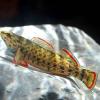It is possible that it is a low D.O. event. The surface gasping certainly points to that. But I'm starting to think there could also be an ammonia spike associated with that as well. Again, depending on what kind of dechlorinator you use, you might be inadvertently dumping in a lot of ammonia (or chloramines) in during those large top-offs. I don't mean to dumb-down my explanation if you're already familiar with it, just elaborating for anyone else following along who might not know much about what happens with chlorine during water changes.
My theory is that some of the dechlorinators only neutralize (free) chlorine---those that haven't bonded with any other molecules. This would be your basic, sodium thiosulfate based neutralizers. [Municipal water treatment centers like using chloramines because the [total] chlorine lasts longer.....~3 days vs ~24 hours with just chlorine alone. However, if there is a lot of chloramines in the water (aka, total chlorine) and you have an older neutralizing product, A few things may be happening. First, nothing is happening to your chloramines. And you nuke your fish that way. Second option, some/all of the chloramines break down into chlorine and ammonia and the 'un-neutralized' ammonia nukes the fish. Third option, the denitrifying bacteria blossom (overnight) and suck up the dissolved O2 in the process. Ergo, low D.O. by morning!
Products like Amquel-Plus have an agent in them that bonds the ammonia into ammonium that is harmless to the fish. Then the ammonium is further broken down by the denitrification process. (BUT!....there could be an increase in dissolved nitrogen gas in the water that is harming the fish!)
6-8 gallons seems so insignificant in a 125 gallon tank. But by the you factor in all the displacement of water by rocks, wood, fish, filters, backgrounds, etc, you may have only 100 gallons of water, or less? IF my theory is touching on something, then it wouldn't be surprising that our pristine water loving stream fish drop so quickly with sudden ammonia or chlorine spikes.
On a side-note, I love me some war-paints. I've seen them handle prolonged warm-water events, and also survive a slow exposure to poor water quality. One of my favorite shiners by far so I feel your loss there too.














